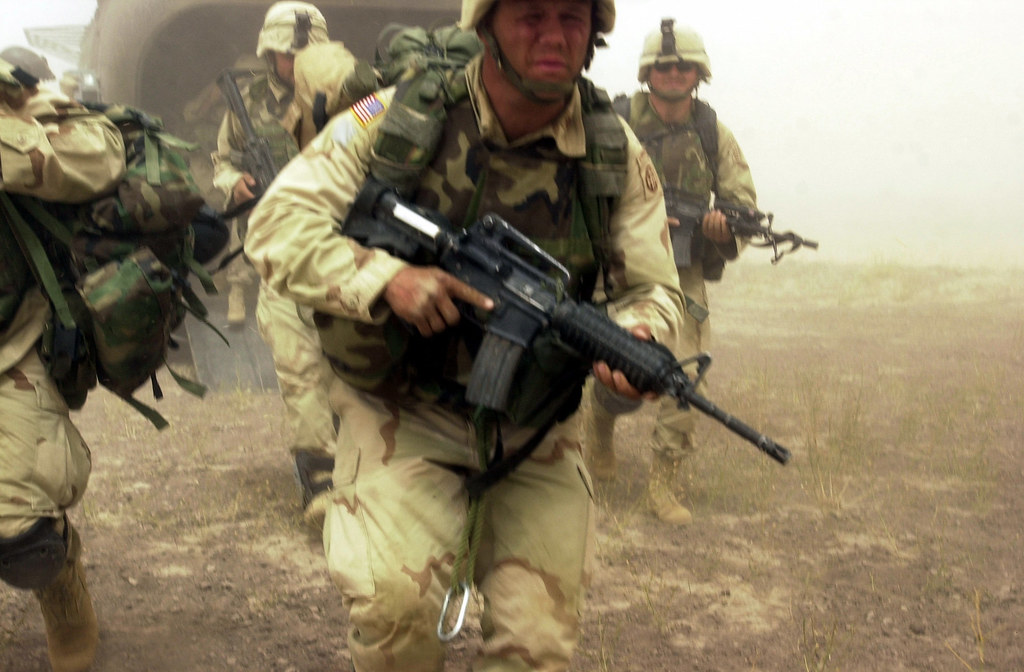 The U.S. military on Friday began its first major offensive against the Taliban since President Obama announced the deployment of an additional 30,000 soldiers to Afghanistan on Tuesday. Operation Cobra’s Anger comprises 900 American Marines and British soldiers from Task Force Helmand, and 150 Afghan soldiers. In concert with the combat assault, a small contingent was dropped behind Taliban lines in northern Now Zad Valley—once a bustling market city of 30,000 that after years of fighting is a ghost town, home only to poppy fields—to disrupt Taliban communications and supply lines. Marine spokesman Maj. William Pelletier reported from Camp Leatherneck in Helmand: “Right now, the enemy is confused and disorganized. They’re fighting, but not too effectively.” Pelletier also reported that the coalition uncovered several arms caches and at least 400 pounds of explosives. Earlier on Friday, after a summit in Brussels, 25 NATO countries pledged 7,000 additional soldiers to Afghanistan, which will bring the combined U.S.-NATO forces to about 150,000 by this summer. NATO Secretary General Anders Fogh Rasmussen told delegates at NATO headquarters that the coming year would “see a new momentum in this mission.” Most of the additional U.S. soldiers will be deployed to the south and east, against the insurgency’s strongholds, whereas most of the additional NATO soldiers will be deployed to the north and west to defend against Taliban incursions and to begin political and economic development. British Prime Minister Gordon Brown will host a special summit on Afghanistan for all troop-contributing nations in London on January 28.
The U.S. military on Friday began its first major offensive against the Taliban since President Obama announced the deployment of an additional 30,000 soldiers to Afghanistan on Tuesday. Operation Cobra’s Anger comprises 900 American Marines and British soldiers from Task Force Helmand, and 150 Afghan soldiers. In concert with the combat assault, a small contingent was dropped behind Taliban lines in northern Now Zad Valley—once a bustling market city of 30,000 that after years of fighting is a ghost town, home only to poppy fields—to disrupt Taliban communications and supply lines. Marine spokesman Maj. William Pelletier reported from Camp Leatherneck in Helmand: “Right now, the enemy is confused and disorganized. They’re fighting, but not too effectively.” Pelletier also reported that the coalition uncovered several arms caches and at least 400 pounds of explosives. Earlier on Friday, after a summit in Brussels, 25 NATO countries pledged 7,000 additional soldiers to Afghanistan, which will bring the combined U.S.-NATO forces to about 150,000 by this summer. NATO Secretary General Anders Fogh Rasmussen told delegates at NATO headquarters that the coming year would “see a new momentum in this mission.” Most of the additional U.S. soldiers will be deployed to the south and east, against the insurgency’s strongholds, whereas most of the additional NATO soldiers will be deployed to the north and west to defend against Taliban incursions and to begin political and economic development. British Prime Minister Gordon Brown will host a special summit on Afghanistan for all troop-contributing nations in London on January 28.
Russia and the United States failed to reach a new agreement on nuclear arms as the midnight expiration of the Strategic Arms Reduction Treaty (START) looms, but both sides say they want a new weapons reduction treaty to come into force as soon as possible. START, which is set to expire at midnight on December 4, is an arms reduction treaty between the United States and Russia signed by Mikhail Gorbachev and George H. W. Bush in 1991. It has led to the removal and destruction of about 80 percent of the world’s nuclear weapons and has also provided an important framework for verification, which will cease to formally exist when the treaty expires. But the Kremlin issued a statement on behalf of the U.S. and Russian presidents on Friday, emphasizing their “commitment, as a matter of principle, to continue to work together in the spirit of the START treaty following its expiration, as well as our firm intention to ensure that a new treaty on strategic arms enter into force at the earliest possible date.” The Russian Foreign Ministry said “intensive work” on a new treaty is ongoing and that “preparations for the signing are coming to a close,” but details of a new agreement have not been finalized. Washington has expressed its determination to establish a new agreement by the end of the year, and hopes to agree on an arms reduction treaty by the time President Obama travels to Oslo next week to accept his Nobel Peace Prize.
 Settlers in the West Bank rejected a personal plea from Israel’s prime minister to respect his 10-month construction freeze, vowing to defy the law and resist any attempts to enforce it. Prime Minister Benjamin Netanyahu announced a moratorium on building new settlements in the West Bank last week, which settler leaders responded to with a civil disobedience campaign that has blocked inspectors from entering the settlements. “You have the right to demonstrate. You have the right to protest,” Netanyahu told settler leaders in a meeting on Thursday, according to a statement released by his office. “You have the right to express an opinion, but it’s unacceptable not to respect a decision that was taken by law.” He did, however, promise that building work could resume after the 10 month-freeze was lifted. The temporary and limited halt to settlement construction is designed to draw Palestinian negotiators to resume peace talks. In his meeting with the settlers, Netanyahu “stressed that this is the optimum decision for Israel at this time, if you look at the overall strategic reality,” said Mark Regev, a spokesman for the prime minister. “This is our confidence-building measure. Now it is in the Palestinians’ court. We have moved in an unprecedented manner, and it is time for them to respond.” The Palestinians contend that the new building restrictions do not go far enough, particularly because they only apply to construction in the West Bank and not to East Jerusalem, as well. But the settlers contend that the moratorium represents “the beginning of the end,” and they have scheduled a mass demonstration for next week in Jerusalem.
Settlers in the West Bank rejected a personal plea from Israel’s prime minister to respect his 10-month construction freeze, vowing to defy the law and resist any attempts to enforce it. Prime Minister Benjamin Netanyahu announced a moratorium on building new settlements in the West Bank last week, which settler leaders responded to with a civil disobedience campaign that has blocked inspectors from entering the settlements. “You have the right to demonstrate. You have the right to protest,” Netanyahu told settler leaders in a meeting on Thursday, according to a statement released by his office. “You have the right to express an opinion, but it’s unacceptable not to respect a decision that was taken by law.” He did, however, promise that building work could resume after the 10 month-freeze was lifted. The temporary and limited halt to settlement construction is designed to draw Palestinian negotiators to resume peace talks. In his meeting with the settlers, Netanyahu “stressed that this is the optimum decision for Israel at this time, if you look at the overall strategic reality,” said Mark Regev, a spokesman for the prime minister. “This is our confidence-building measure. Now it is in the Palestinians’ court. We have moved in an unprecedented manner, and it is time for them to respond.” The Palestinians contend that the new building restrictions do not go far enough, particularly because they only apply to construction in the West Bank and not to East Jerusalem, as well. But the settlers contend that the moratorium represents “the beginning of the end,” and they have scheduled a mass demonstration for next week in Jerusalem.
 The dollar strengthened on Friday against both the yen and the euro after U.S. labor statistics reported that U.S. job losses in November were less than 10 percent of the expected figure. Gold, in turn, which strengthened to a record high on Thursday after rallying for weeks against expectations for a falling dollar, weakened slightly on Friday along with other metals. The dollar appears to be recovering from hitting a 14-year low against the Japanese yen last week, and is likely to continue strengthening as the United States further emerges from the recession, with job growth—and the recent less-than-expected job losses a small but encouraging sign—viewed as a principal indicator of future economic gains. Similarly, the Canadian dollar rose after Canada reported a jobs increase of 79,000, far more than expected. The stock markets responded positively to the labor markets. Upon the opening bell on Wall Street on Friday, the S&P 500, the NASDAQ composite, and the Dow Jones all hit intra-day highs for the year. Overseas, London’s FTSE 100 rose 1 percent and the FTSE Eurofirst 300 added 1.7 percent. UBS’ director of floor operations at the NYSE, Art Cashin, said of the U.S. employment statistics, “Santa Clause may have come early with this number.”
The dollar strengthened on Friday against both the yen and the euro after U.S. labor statistics reported that U.S. job losses in November were less than 10 percent of the expected figure. Gold, in turn, which strengthened to a record high on Thursday after rallying for weeks against expectations for a falling dollar, weakened slightly on Friday along with other metals. The dollar appears to be recovering from hitting a 14-year low against the Japanese yen last week, and is likely to continue strengthening as the United States further emerges from the recession, with job growth—and the recent less-than-expected job losses a small but encouraging sign—viewed as a principal indicator of future economic gains. Similarly, the Canadian dollar rose after Canada reported a jobs increase of 79,000, far more than expected. The stock markets responded positively to the labor markets. Upon the opening bell on Wall Street on Friday, the S&P 500, the NASDAQ composite, and the Dow Jones all hit intra-day highs for the year. Overseas, London’s FTSE 100 rose 1 percent and the FTSE Eurofirst 300 added 1.7 percent. UBS’ director of floor operations at the NYSE, Art Cashin, said of the U.S. employment statistics, “Santa Clause may have come early with this number.”